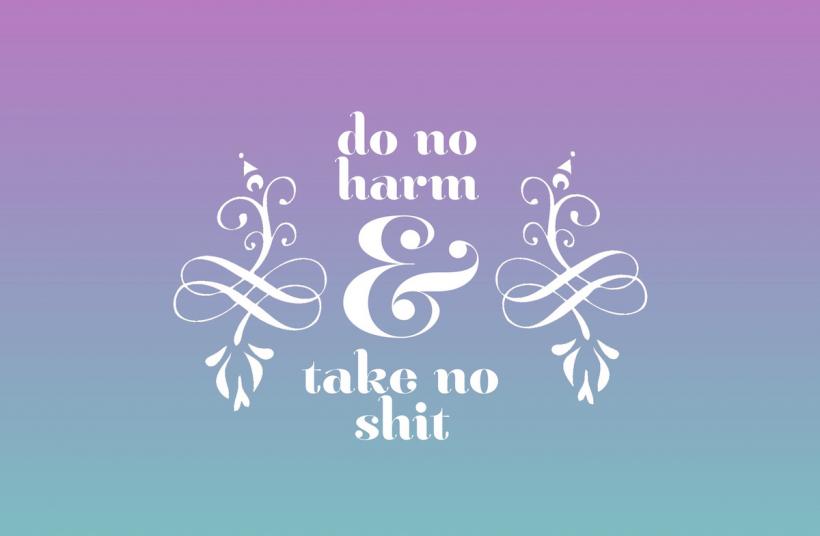
It’s time you set the boundary.
One might not think of setting boundaries as a form of self-care, but in a way, most self-care starts with boundaries and self-awareness. Without boundaries and self-awareness, there is no “I had better stop, this is getting to be too much for me” or simple re-charge time.
Beyond that, boundaries strengthen our relationship with the world around us, as well as ourselves.
Boundaries help us achieve our goals and protect our well-being.
When you set boundaries, you state “This is what I’m worth” instead of bowing to the needs of everyone around you and placing them above your own. When people get their needs met, they can meet each other on even footing, with no unspoken power imbalance.
“Because I didn’t set healthy personal boundaries, I was exhausted, I couldn’t focus, and I felt consumed by drama around me, in both my personal and professional lives. As I result, I dealt with a lot of conflict, failed to take care of myself and generally disliked my work,” Britt Bolnick of In Arms Coaching tells readers.
Setting boundaries may sound trite, but for many of us, the process can be incredibly difficult. Those of us raised in dysfunctional families often either put up a million roadblocks to intimacy or have very few boundaries with communications and expectations. Either way, many of us haven’t had a ton of experience with the modeling of healthy boundaries and therefore have to start this work from scratch.
Unhealthy boundaries usually take the form of being too rigid or too loose, as pointed out by Serenity Online Therapy. Rigid walls produce folks that seem aloof and disinterested, who avoid discussions of emotions and are extremely self-sufficient because they cannot trust others to let them in.
People with loose boundaries can be too forward with touch, assuming that everyone is comfortable with it because they are. Sometimes it takes the form of lots of sex, and sometimes that sex can be confused for love. Even in friendships, these folks often create bonds too quickly to truly have the roots and groundwork built for genuine relationships. These people may be deeply empathetic to the point of taking on the emotions of others, quickly becoming overwhelmed and simultaneously giving too much and taking too much. People-pleasers, those with loose boundaries don’t know how to say “no” when they need to, take on the feelings of others as their responsibility, and need to be told that everything is alright. They’re drama queens because they do not know how to close the door when they need to.
Think of these two situations as two extremes: one person is locked in a room with no windows and no doors, whereas the other is completely exposed to everything at all times. Neither is a healthy way to live, and there is a healthy life somewhere between the two.
Many folks assume that discussion of boundaries only relates to romantic relationships, but to pursue those relationships, one should set aside time to reflect on themselves first. Let’s make it less about romance and more about growth. Rather than look at how boundaries relate to other people, let’s start with ourselves.
Here are several steps to creating healthier boundaries to help you achieve your goals.
1. Practice Self-Awareness.
To create these boundaries, you have to practice a greater self-awareness to recognize what you need and where your limits lie. The first step toward establishing healthy boundaries is to identify your triggers. What really bothers you? What makes you internally boil, yet you constantly find yourself putting up with it? Conversely, what makes you tune out and shut off from contact with others? Identify your limits and stay firm. People mess up, but it’s your job to own your feelings in response to it and tell them what you will not tolerate if they cross a line, either knowingly or by accident.
Check out this surprisingly awesome self-awareness assessment activity from Oprah.com. Yes, Oprah. No, really… shut up and do it, you’ll thank us later.
2. Make Goals And Stick to Them.
How many times have you said “I’d like to do this” or “I’d like to make this happen” and simply not followed through? To start reaching goals, you have to begin setting boundaries for yourself. Are you binge-watching Netflix and not getting assignments completed? Has your internet-based social media life become a stand-in for IRL relationships and intimacy?
Give yourself a limit and set a goal. Hold yourself accountable to that goal. If you say you are going to do something, follow through. Otherwise, you’re not only disappointing whoever may be depending on you, but you’re also hurting yourself.
3. Are You Getting What You Need?
Is there an even give-and-take within your friendships and other relationships or are you doing all of the giving or taking? Do you have a partner that takes off whenever they want to, sticking you with parental duties by yourself? Are you eating, sleeping, and taking care of your health before you put someone else’s needs before your own? These are just a few questions to ask yourself.
4. Do No Harm, Take No Shit.
Are you allowing someone to say hurtful things and be overly critical? It’s time you set the boundary. By letting them continue to put you down, you paint yourself as a punching bag and after a while begin to internalize the negativity.
Before you respond to the aggressor, take a moment for self-assessment. Ask yourself:
How much of this is true about me?
How much of this is about the other person?
What do I need to do (if anything) to regain my personal power or stand up for myself?
Once you have assessed your feelings, you can move forward with telling the person how you feel, how it affects your relationship with them, and what you need to change.
5. Find Someone With Whom To Process These Feelings.
Is there someone that you can talk to about your boundary-setting process? Perhaps a friend who is going through the same thing whom you can share the responsibility of support and talk through your mutual processes? Maybe a support group relating to the topic, church group, or life coach?
This is an excellent time to seek out a knowledgeable therapist who can assist you with these changes. No lie — it’s going to feel weird. If you’re a people pleaser, it’s going to feel unnatural to say no, and you may deal with some feelings of guilt. If you’re an ice queen, it’s going to be bizarre to put yourself out there and tell people what hurts you.
A professional therapist is a really great way to start this personal growth with the proper backup that you’ll need for processing everything that goes along with altering your lifestyle and making healthy, sustainable changes.








